Algospeak / Slang Replacement
Part of a series on Internet Slang. [View Related Entries]
[View Related Sub-entries]
This submission is currently being researched & evaluated!
You can help confirm this entry by contributing facts, media, and other evidence of notability and mutation.
About
Algospeak, also known as Voldemorting or Slang Replacement, is a term that refers to the replacement of keywords and phrases deemed NSFW or not brand-safe according to social media algorithms on platforms like TikTok, Twitch, Instagram and YouTube, among others, as well as online games. The term is a portmanteau of the words "algorithm" and "speak." The history of algospeak dates back to examples like unalive, which function as a way to write banned and censored words or topics without fear of demonetization or removal. Many examples use symbols and emojis to replace letters and words or simple alternate spellings and phrases. In 2022, the term became more widely known due to the necessity of the practice for marginalized communities as chat and word filters became prevalent online.
Origin
Precursors / Voldemorting
Though the term "algospeak" is relatively new, the practice of circumventing censored words and phrases in chats or comments has existed online since at least the early to mid-2000s, particularly in online gaming. One example of an early algospeak term is unalive, which is used online as an alternative to death-related words like "kill," "dead" and "murder." Although the term first appeared in a 2013 episode of Ultimate Spider-Man, it wasn't until January 24th, 2015, that it was added to Urban Dictionary, [1] earning over 60 likes in seven years (shown below). Other terms like "Ouid" or "Oui'd" represent a different way of saying Weed, first added to Urban Dictionary[2] in 2018.

On June 28th, 2018, Emily van der Nagel,[3] a Lecturer in Social Media at Monash University, published a scholarly article titled, "‘Networks that work too well’: intervening in algorithmic connections," which outlined the term "Voldemorting" — a concept coined by her to describe "not mentioning words or names in order to avoid a forced connection." The author claimed that the practice originated from deliberately starving "trash celebrities" of attention by not referring to them by name.
On October 9th, 2018, Gretchen McCullogh wrote an article for Wired[4] magazine titled, "Welcome to Voldemorting, the Ultimate SEO Dis," that further highlighted Emily van der Nagel's term. McCullogh primarily highlighted the use of the words "cheeto" and "45" to refer to former U.S. President Donald Trump. McCullogh further pried at the question of, "What does it mean to be a human brain supplemented by the extended memory of internet search?"
On July 13th, 2021, Abby Ohlheiser write an article for the MIT Technology Review[5] that highlighted more specifically the effect of TikTok's algorithm on the necessity of algospeak. Ohlheiser led the article with evidence of users with Black Lives Matter in their bios being flagged as "inappropriate content."
On December 10th, 2021, Allegra Rosenberg[6] wrote a section within Ryan Broderick's "Garbage Day" newsletter titled, "TikTok Self-Censorship," which further emphasized "Voldemorting" as a concept. Rosenberg specifically linked the "unalive" trend back to the concept, reiterating its origin within suicide help/prevention circles on the platform.
Algospeak
On December 15th, 2021, Twitter[7] user 0xabad1dea posted a tweet that stated, "Algorithms are causing human language to reroute around them in real time …" citing evidence of a YouTuber using the term "unalive" to avoid demonetization. The tweet earned roughly 35,600 likes over the course of four months (shown below, left). Later the same day, Twitter[8] user LokiJulianus posted a quote retweet that uttered the term "algospeak," being the first to do so in the new context and earning over 70 likes in the same amount of time (shown below, right).


Spread
On April 8th, 2022, Washington Post[9] reporter Taylor Lorenz published an article that emphasized the term "algospeak" over "Voldemorting," further popularizing the term. Within the article, Lorenz listed multiple algospeak terms used on TikTok, such as: seggs (sex), nip nops (nipples), le dollar bean (lesbian), swimmers (vaccinated people), saltines (crackers), spicy eggplant (vibrator), SA (sexual assault), accountants (sex workers), corn (porn), leg booty (LGBTQ community), among others. These terms referenced groups on the platform like LGBTQ+ creators being targeted, as well as Twitch streamers being targeted for saying "cracker," like when HasanAbi was banned for saying it during a livestream.
Search Interest
External References
[3] van der Nagel – Networks that work too well
[4] Wired – Welcome to Voldemorting
[5] MIT Tech Review – Welcome to TikTok’s endless cycle of censorship and mistakes
[6] Garbage Day – TikTok Self-Censorship
[7] Twitter – @0xabad1dea
[8] Twitter – @LokiJulianus
[9] Washington Post – Internet ‘algospeak’ is changing our language in real time

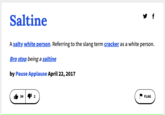


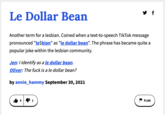
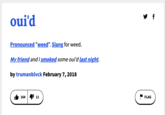
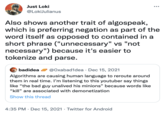
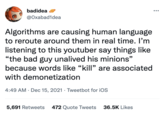
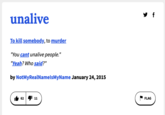
Top Comments
DLD493v2
Apr 08, 2022 at 04:46PM EDT
Gone
Apr 08, 2022 at 05:18PM EDT